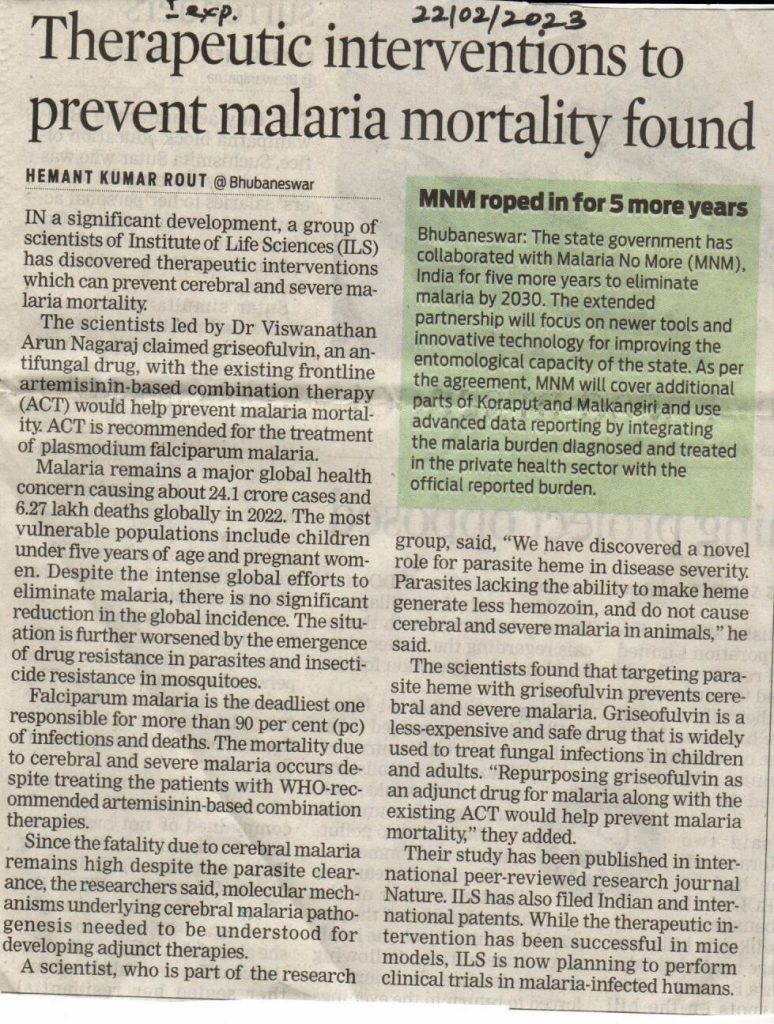Therapeutic Interventions for Cerebral Malaria
The research group led by Dr Viswanathan Arun Nagaraj has shown that griseofulvin, a FDA-approved anti-fungal drug, can prevent cerebral malaria in animal models and it can be used with the existing frontline Artemisinin-based Combination Therapies (ACTs) to prevent malaria mortality in humans. The findings were published in Nature Communications and at present, efforts are being made to conduct clinical trials in humans.



Malaria remains a major global health concern causing 247 million infections and 619,000 deaths in 2021. The most vulnerable populations include children under five years of age and pregnant women. In spite of the intense global efforts to roll back malaria, there is no significant reduction in the global incidence since 2015 and rather, there is a considerable increase. This is further worsened by the emergence of drug resistance in parasites and insecticide resistance in mosquitoes. Falciparum malaria is the deadliest one responsible for more than 90% of infections and deaths. The mortality due to cerebral and severe malaria occurs despite treating the patients with WHO-recommended artemisinin-based combination therapies (ACTs). The last resort is intravenous administration of antimalarials – artemisinin or quinine, along with supportive therapies. Therefore, there is a need of adjunct therapy to prevent malaria mortality.
Heme is required for various cellular functions and malaria parasite makes its own heme. Interestingly, the blood stage parasites causing disease can also acquire heme from human hemoglobin by degrading it in a specialized organelle called “food vacuole”. The excess heme is converted into hemozoin, the parasite pigment readily detectable in infected person’s blood and responsible for disease severity. It was earlier shown that parasite heme is not required for blood stage growth, but essential for the mosquito- and liver-stage development. However, the question of why blood stage parasites make heme has remained unanswered. Scientists from Institute of Life Sciences (ILS), Bhubaneswar, led by Dr Arun Nagaraj aimed at identifying new therapeutic interventions have discovered a novel role for parasite heme in disease severity. Parasites lacking the ability to make heme generate less hemozoin, and do not cause cerebral and severe malaria in animal models. Parasite heme is important for food vacuole function and hemozoin formation. Further, they show that targeting parasite heme with griseofulvin – a FDA-approved antifungal drug, prevents cerebral and severe malaria in mice. Griseofulvin is a less-expensive and safe drug that is widely used to treat fungal infections in children and adults. Therefore, repurposing griseofulvin as an adjunct drug for malaria along with the existing frontline ACTs would help to prevent malaria mortality. This study was published in Nature Communications https://doi.org/10.1038/s41467-022-31431-z), and Indian and international patents have been filed. ILS is now planning to perform clinical trials in malaria-infected humans.